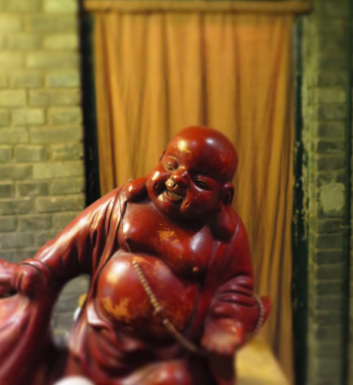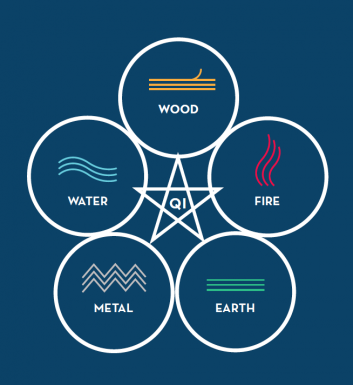
How to be happy
Emotional Balance is here
Imagine temporarily putting aside all your cares, leaving your cell phone at home, forgetting about email, work, your countless family obligations, and talking a long, meandering walk in the woods. Notice the dappled sunlight that breaks through the canopy of leaves above you. Take a moment to appreciate the sounds, of birds, of insects, and the textures of the forest floor, the delicate understory, and the hearty tree trunks that rise up around you. Let yourself meld into your surroundings. Feel yourself in the flow of the world. This image is very much the sort of thing evoked by the name of Chinese medicine formula that forms of basis of Emotional Balance. Known as Xiao Yao Powder in Chinese, this formula has a uniquely evocative name that means to wander freely, to ramble, to move unimpeded and unfettered. This same phrase, Xiao Yao, is also the title of the first chapter of the famous Daoist text, Zhuang Zi and it captures beautifully the philosophy of this great Daoist thinker of the same name. Zhuang Zi stressed above all the importance of being in the flow, of becoming one with the Way.
Like its suggestive name, one of the central goals of this formula is to achieve free flow, in this case the free flow of qi. We often translate the concept of “qi” into English as energy. But in Chinese medicine, qi is more properly a way for speaking about the constant movement and motion that constitutes life. If that movement is impeded, then one’s flow of qi is constrained, leading to a wide range of symptoms. One important manifestation of the constrained flow of qi is emotional volatility. All of us experience a range of emotions in our daily lives – frustration at being late for an important meeting, joy when your child does something sweet for you, sadness at the news of an elderly relative whose has fallen sick. But when qi is constrained, our emotional response can be exaggerated and uncontrolled. Instead of experiencing our emotions and processing them in a healthy way, we may hold on to them, fuming for an entire day at the slightest insult, consumed by the stress of work, unable to return to our proper emotional balance. Conversely, ongoing emotional volatility itself can be an important cause of what Chinese medicine doctors call “qi constraint,” producing some of the other symptoms that Xiao Yan Powder treats. Indeed, some doctors have argued that the pace of our modern world, enabled by technology that makes us more efficient, but leading us to overextend ourselves, can itself be the cause of qi constraint and emotional volatility. When we often find ourselves feeling at odds with the world around us, exhausted, inflexible, emotionally frayed. This is the situation where an intervention with Emotional Balance may be able to break this vicious cycle.

Although Emotional Balance might sound like the perfect antidote to the ills of modern life, its use is both narrower and wider than one might suppose. This formula is used for a broad range of symptoms that doctors of Chinese medicine recognize as being related – both directly and indirectly – to an obstruction of the free flow of qi. Under these circumstances, doctors would not only expect to see emotional volatility, but also a range of other discomforts that might include dizziness and headaches, pain in the flanks, depressed appetite, fatigue, menstrual irregularity, breast tenderness, alternating sensations of hot and cold, abdominal pain, to dry mouth and throat. In order to understand how and under what conditions Emotional Balance could be effective for these various symptoms, it’s important to understand a little about the underlying “pathology” it is designed to treat. As mentioned above, “qi constraint” is one of central underlying conditions and it directly affects the Liver, not the anatomical organ but the Chinese medicine understanding of this organ. Historically, doctors of Chinese medicine have been less interested the structural foundations of the body, then in its functional operations and its resonances with the world we live in. Thus the Liver in Chinese medicine is the organ responsible for storing Blood and ensuring the smooth flow of qi in the body. It is also associated with the season of spring, when tender new plants and branches start to grow, extending towards the sun. Constrained Liver qi is therefore analogous to an impediment to this new growth. , individuals may experience some combination of emotional irritability, breast tenderness prior to menstruation, pain in the flanks or abdomen, headaches, dizziness, dry mouth, and other symptoms.
What makes Emotional Balance such an intriguing formula is that it doesn’t just address the problem of qi constraint, but also its pathological consequences as well. One of the most commonly seen outcomes of qi constraint in the Liver is that over time it will depress appetite and digestion. Many readers may know this condition well: in moments of considerable stress, we tend to lose our appetites. In the technical terms of Chinese medicine, Liver qi constraint causes a deficiency of Spleen qi. Quite unlike the anatomical organ, the Spleen in Chinese medicine is the center of the digestion, absorbing and transporting nutrients and liquids. It is associated with the color yellow, traditionally the color of the emperor, and like the emperor who is at the center of the cosmos, the Spleen is imagined to be at the center of the body and its processes. As a result, when Liver qi is constrained and impairs the Spleen, we may feel drained, lethargic, fatigued. We may find ourselves turning to caffeine or sugar to get us through the day, even though we may be getting adequate sleep. On top of this, our appetite and digestion may be off.

Over time, with the ongoing stress of work, family, and other pressures, these pathological states may not resolve themselves and instead become self-reinforcing. Among the many functions of the Spleen, one of them is to produce Blood – similar to but again not the same as the entity of the same name from Western medicine. A deficient Spleen qi that fails to generate enough Blood will ultimately affect the Liver, which stores Blood. In turn, Liver Blood deficiency further impairs the dispersal of qi, continuing or exacerbating the problem of qi constraint. It is at this point that the patient may be stuck in something of a downward, reinforcing cycle and only an intervention with Emotional Balance may be able to correct the imbalance.
The reason why Emotional Balance can be so effective for treating emotional volatility and the wide-range of symptoms that may accompany it is that it is designed precisely to address the underlying pathological complexity described above. Using a treatment principle known as “harmonization,” the formula addresses all three problems at once. Bupleurum and Mint gently promote the smooth circulation of the Liver qi; Atractylodes, Poria, cooked Licorice, and baked Ginger restore the Spleen’s qi, Peony and Dang Gui nourish Liver Blood. The result of this nicely balanced formula is usually a fairly quick improvement in the patient’s condition. Whether one is struggling with the mood swings and discomforts of premenstrual syndrome (PMS), the fatigue and digestive complaints brought on by emotional upset, or headaches and other discomforts so common to a stressful work environment – all issues caused by the pathological triumvirate of Liver qi constraint, Spleen qi deficiency, and Blood deficiency – Emotional Balance may be the answer for you.












